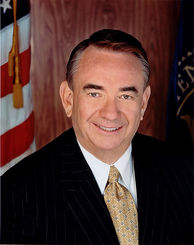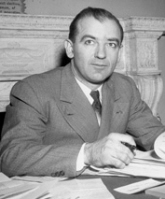Thompson Wins Most Competitive Wisconsin GOP US Senate Primary Since 1957
The former governor’s 3.1-point win over Eric Hovde is the sixth closest in party history out of 37 contests

In the intervening months, the former four-term Wisconsin governor withstood a surge in the polls by businessman Eric Hovde as well as former U.S. Representative Mark Neumann (perhaps aiding in his victory) to eke out a 3.1-point win in the Badger State.
Thompson won with 34.0 percent of the vote followed by Hovde at 30.9 percent, Neumann at 22.8 percent and Assembly Speaker Jeff Fitzgerald at 12.4 percent.
Thompson’s win caps off one of the most competitive Republican primaries for a U.S. Senate seat in state history:
· The 3.1-point margin is the sixth narrowest among the 37 such Republican contests that have been conducted in Wisconsin since 1914 and the closest since a special election in the state 55 years ago in 1957.
· Thompson’s 34.0 percent of the vote is the fourth lowest among GOP primary winners, just ahead of Fred Clausen in 1940 (31.2 percent), Francis McGovern in 1914 (32.2 percent), and Alexander Wiley in 1938 (32.9 percent).
· Only three other contests in GOP U.S. Senate primary history have resulted in three candidates receiving at least 22 percent of the vote: in 1914, 1980, and 2004.
Prior to Tuesday’s contest, the average margin of victory across the previous 36 cycles of Republican U.S. Senate primaries was 42.5 points with the winner averaging 66.1 percent of the vote.

In that cycle, Joe McCarthy made his second consecutive run at a senate seat and defeated four-term incumbent Robert La Follette, Jr. by 1.2 points, or 5,378 votes – 47.2 to 46.0 percent.
McCarthy had been trounced in his previous effort to unseat fellow Republican Alexander Wiley two years prior. Wiley nearly doubled up on McCarthy with a 25.4-point victory – 52.7 to 27.3 percent.
Four other Republican U.S. Senate primaries have been decided by less than three points in the Badger State:
· 1918: Irvine Lenroot (50.8 percent) defeated James Thompson (49.2 percent) by 1.6 points.
· 1932: John Chappel (50.8 percent) defeated incumbent John Blaine (49.2 percent) by 1.6 points.
· 1956: Alexander Wiley (48.9 percent) defeated Glenn Davis (46.7 percent) by 2.2 points.
· 1957 (special): Walter Kohler (34.4 percent) defeated Glenn Davis (31.7 percent) by 2.7 points in a seven-candidate field after the death of Senator McCarthy.
Wisconsin GOP: Battered But Not Bruised?
With Republicans now settled on a nominee after a grueling primary campaign, the party can finally turn its attention over the next two and a half months to Democratic nominee Tammy Baldwin, who ran uncontested for her party’s nod.
Despite the brutal campaign, competitive U.S. Senate primaries have tended not to hurt the Republican Party when it comes to the general election.
Of the 10 such senate primaries that have been decided by less than 10 points, the victor has gone on to win the general election in November on seven occasions (in 1918, 1920, 1926, 1938, 1946, 1956, and 1980) while losing just three times (in 1914, 1932, and 1957).
By contrast, of the eight cycles in which the Republican primary winner ran uncontested, the candidate lost the race seven times: in 1934, 1958, 1964, 1970, 1976, 1998, and 2006. (Only one-term incumbent Robert Kasten took an uncontested primary win en route to a general election victory in 1986).
Hovde had hoped to become to become just the third Republican and fifth candidate overall to be elected to the U.S. Senate in Wisconsin without previously holding political office – joining current GOP Senator Ron Johnson, a businessman who was elected in 2010.
Mark Neumann’s failure to launch a successful U.S. Senate campaign was not surprising given the political history of ex- or sitting U.S. Representatives. With his primary loss just 2 of 16 former or sitting members of the U.S. House from Wisconsin have won U.S. Senate seats (Irvine Lenroot in 1918 and Robert Kasten in 1980), with Rep. Baldwin’s fate still pending.
The 580,340 voters in the contest is the fourth largest raw number of votes cast in a GOP Wisconsin U.S. Senate primary behind 1952 (759,273), 1932 (687,033), and 2010 (595,830).
Republicans in Wisconsin are attempting to hold both U.S. Senate seats for the first time since 1957 when Alexander Wiley and Joseph McCarthy were in office – the eighth longest such drought in the nation behind Louisiana (1872), Florida (1875), Arkansas (1885), Montana (1911), Rhode Island (1935), Massachusetts (1953), and Michigan (1955).
Wisconsin Republican U.S. Senate Primary Winners and Margin of Victory, 1914-2012
|
Year
|
Winner
|
Percent
|
2nd Place
|
Percent
|
MoV
|
|
2012
|
Tommy Thompson
|
34.0
|
Eric Hovde
|
30.9
|
3.5
|
|
2010
|
Ron Johnson
|
84.7
|
Dave Westlake
|
10.3
|
74.4
|
|
2006
|
Robert Lorge
|
99.7
|
(unopposed)
|
0.0
|
99.7
|
|
2004
|
Tim Michels
|
42.4
|
Russ Darrow
|
30.1
|
12.3
|
|
2000
|
John Gillespie
|
68.0
|
Bill Lorge
|
20.6
|
47.4
|
|
1998
|
Mark Neumann
|
99.7
|
(unopposed)
|
0.0
|
99.7
|
|
1994
|
Robert Welch
|
47.4
|
Matthew Gunderson
|
22.4
|
25.0
|
|
1992
|
Robert Kasten
|
80.5
|
Roger Faulkner
|
19.5
|
61.0
|
|
1988
|
Susan Engeleiter
|
57.0
|
Stephen King
|
40.5
|
16.5
|
|
1986
|
Robert Kasten
|
100.0
|
(unopposed)
|
0.0
|
100.0
|
|
1982
|
Scott McCallum
|
67.7
|
Paul Brewer
|
32.3
|
35.4
|
|
1980
|
Robert Kasten
|
36.8
|
Terry Kohler
|
29.0
|
7.8
|
|
1976
|
Stanley York
|
100.0
|
(unopposed)
|
0.0
|
100.0
|
|
1974
|
Tom Petri
|
85.2
|
James Sigl
|
14.8
|
70.4
|
|
1970
|
John Erickson
|
100.0
|
(unopposed)
|
0.0
|
100.0
|
|
1968
|
Jerris Leonard
|
50.8
|
Robert Johnson
|
28.0
|
22.8
|
|
1964
|
Wilbur Renk
|
100.0
|
(unopposed)
|
0.0
|
100.0
|
|
1962
|
Alexander Wiley
|
80.3
|
Arlyn Wollenburg
|
19.7
|
60.6
|
|
1958
|
Roland Steinle
|
100.0
|
(unopposed)
|
0.0
|
100.0
|
|
1957
|
Walter Kohler
|
34.4
|
Glenn Davis
|
31.7
|
2.7
|
|
1956
|
Alexander Wiley
|
48.9
|
Glenn Davis
|
46.7
|
2.2
|
|
1952
|
Joseph McCarthy
|
67.9
|
Leonard Schmitt
|
28.1
|
39.8
|
|
1950
|
Alexander Wiley
|
77.8
|
Edward Finan
|
22.2
|
55.6
|
|
1946
|
Joseph McCarthy
|
47.2
|
Robert La Follette Jr.
|
46.0
|
1.2
|
|
1944
|
Alexander Wiley
|
52.7
|
Joseph McCarthy
|
27.3
|
25.4
|
|
1940
|
Fred Clausen
|
31.2
|
John Koehler
|
18.5
|
12.7
|
|
1938
|
Alexander Wiley
|
32.9
|
John Chapple
|
26.4
|
6.5
|
|
1934
|
John Chappel
|
100.0
|
(unopposed)
|
0.0
|
100.0
|
|
1932
|
John Chappel
|
50.8
|
John Blaine
|
49.2
|
1.6
|
|
1928
|
Robert La Follette, Jr.
|
66.7
|
George Mead
|
33.3
|
33.4
|
|
1926
|
John Blaine
|
50.1
|
Irvine Lenroot
|
44.7
|
5.4
|
|
1925
|
Robert La Follette, Jr.
|
55.9
|
Roy Wilcox
|
25.7
|
30.2
|
|
1922
|
Robert La Follette
|
72.2
|
William Ganfield
|
27.8
|
44.4
|
|
1920
|
Irvine Lenroot
|
46.3
|
James Thompson
|
40.9
|
5.4
|
|
1918
|
Irvine Lenroot
|
50.8
|
James Thompson
|
49.2
|
1.6
|
|
1916
|
Robert La Follette
|
60.0
|
Malcolm Jeffris
|
40.0
|
20.0
|
|
1914
|
Francis McGovern
|
32.2
|
Levi Bancroft
|
22.7
|
9.5
|
Table compiled by Smart Politics with data from Wisconsin Blue Books.
Follow Smart Politics on Twitter.
